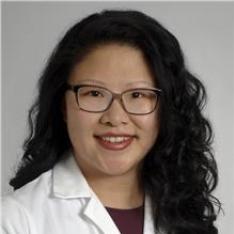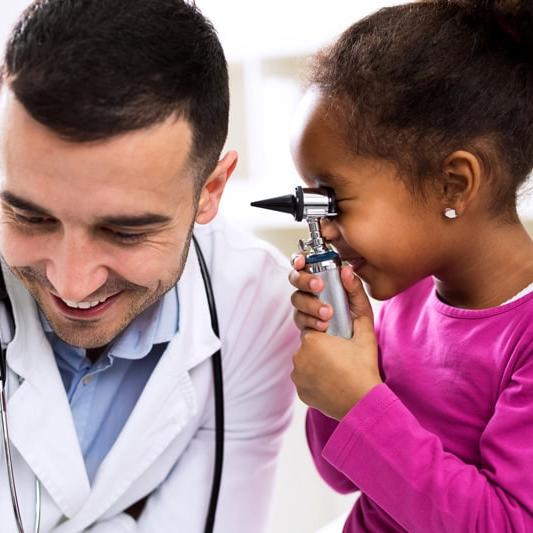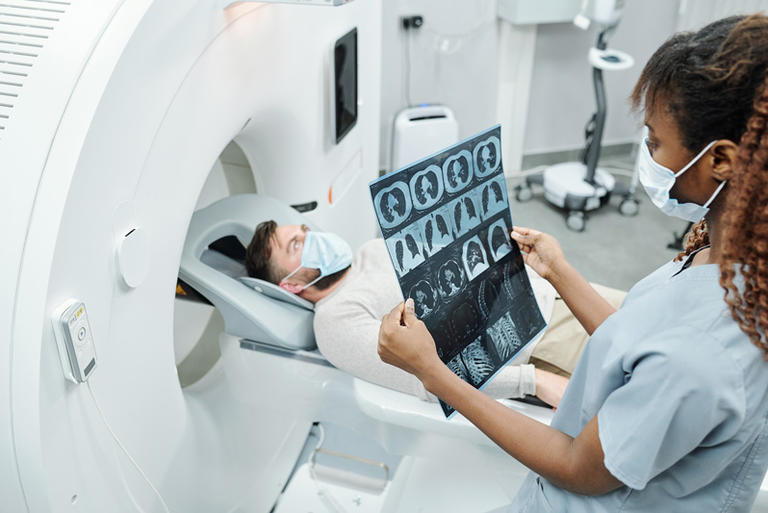If you are interested in becoming a doctor who focuses on treating a wide range of diseases and conditions in adults, you might consider a career in internal medicine. You may be curious to know exactly what is internal medicine? As a doctor of internal medicine, you diagnose and treat conditions of internal organs, but you also provide comprehensive medical care and serve as the first point of care for your patients.
Internal medicine often attracts doctors interested in a broad range of primary care and in the building of patient relationships that may last for many years. If you are considering a career in internal medicine, ask yourself these questions:
- Do you enjoy talking to patients and forming a relationship with them?
- Do you want to work in both a hospital and in an office?
- Do you seek variety in your work—treating an ear infection in one patient while puzzling through a complex coronary issue with the next?
- Do you want a career in one of the most in-demand fields of medicine?
- Do you want to focus on treating adult patients rather than children?
If your answer to these questions is “yes,” then a career as a doctor of internal medicine—also called an internist—might be the specialty for you.
What is an Internal Medicine Doctor?
Internal medicine originated in Germany, where the specialty of combining laboratory research with patient care was called innere medizin. In the early 1900’s, German doctors brought this specialty to the United States, where it was anglicized as internal medicine. The specialty name may be confusing, because while internal medicine physicians specialize on internal systems, they also treat the whole body.
Internal medicine combines clinical diagnostics on a wide range of complex and common conditions with a personalized and compassionate approach to medicine. A doctor of internal medicine specializes in managing diseases of such internal organs as the heart, kidneys, liver, and lungs, while also serving as primary care physicians for patients aged 18 and older.
Internal medicine doctors focus on disease prevention, mental health, substance abuse, and treatment of common problems of the ears, eyes, nervous system, reproductive organs, and skin. They also diagnose and treat such chronic adult conditions as diabetes and cardiovascular disease. They often consult with other medical specialists to treat patients.
HOW TO BECOME AN INTERNAL MEDICINE DOCTOR
To become an internist, you must first become a physician by graduating from an accredited medical school*—such as Ross University School of Medicine (RUSM). The steps to a medical degree at RUSM, which is located on the Caribbean island of Barbados, are the same as at United States-based schools: two years of medical science classes and two years of hands-on clinical training. For RUSM students, the medical sciences curriculum is completed on the Barbados campus; the clinical training can be completed at affiliated teaching hospitals in the United States.
During clinical training, RUSM students complete core rotations in internal medicine, surgery, pediatrics, family medicine, obstetrics/ gynecology, and psychiatry. Each individual student, then, selects from among 40 specialty elective clerkships to fulfill their remaining clinical requirements.
During the fourth and final year of medical school, students prepare for the next step in their medical education: residency. At RUSM, the Office of Career Advisement (OCA) helps students determine which residency specialty—such as internal medicine—suits them best. The OCA then helps students negotiate the National Resident Matching Program® (NRMP®)—a placement system which medical students who want to obtain licensure in the United States use to “match” with a medical residency. Residencies are required to become a licensed physician, and they last from three to eight years. A residency in internal medicine is typically three years, but the American College of Physicians® reports that only about half of all internists stop there to practice general internal medicine and serve as primary care physicians. The other half uses internal medicine as a preliminary residency before moving on to one of the many branches of internal medicine. These subspecialties include:
- Cardiology
- Endocrinology
- Gastroenterology
- Hematology
- Hospital medicine
- Infectious diseases
- Nephrology
- Oncology
- Pulmonary care
- Rheumatology
An internal medicine resident may also combine training with another specialty, which allows them to be “double-boarded” by both the American Board of Internal Medicine® and the certification board of their other medical specialty. Common specialty residencies paired with internal medicine include:
- Anesthesiology
- Dermatology
- Emergency medicine
- Family medicine
- Medical genetics
- Neurology
- Pediatrics
- Preventive medicine
- Psychiatry
In 2021, RUSM had a first-time residency attainment rate of 92 percent for 2020-2021 graduates, a match percentage rate comparable with the overall match rate (93 percent) for medical schools in the United States. In recent years, RUSM MD’s have matched with hundreds of internal medicine residencies at hospitals across the United States. These hospitals include Ascension Providence Hospital in Michigan; the Cleveland Clinic Florida; Kern Medical Center in California; and Mount Sinai Beth Israel in New York.
MEET A INTERNAL MEDICINE HOSPITALIST
Melissa A. Woo, MD, a 2016 RUSM graduate, is an internal medicine hospitalist at Cleveland Clinic Florida in the Miami-Fort Lauderdale metro area. We asked Dr. Woo to describe the role of an internal medicine hospitalist.
Q: Why did you decide to go into internal—and then hospital—medicine?
A: When I was a third year medical student I came to learn that I loved non-surgical specialties, and I wanted to work with adults. The third year core internal medicine rotation at Cleveland Clinic Florida (CCF) showed me the wide variety of cases, both bread and butter and rare cases, that one can come across in Internal Medicine, and in a very academic setting. I realized that I really enjoyed being able to manage all of the organ systems, so I knew that internal medicine would be the right fit for me. As time went on during residency training at CCF, I fell in love with my hospital rotations, so I knew becoming a hospitalist was the right path for me. I loved CCF so much from my time as a medical student and resident, and I am so thankful that I have been able to stay on as a staff hospitalist!
Q: Any advice to medical students considering the specialty?
A: My advice is to keep an open mind. When I was a third year medical student at RUSM, it became quite clear during my rotations that I was falling in love with internal medicine. However I really gave my all with each core rotation. When I started my journey at RUSM I did not know what specialty was for me, but I kept in very close touch with the RUSM OCA who helped guide me in the decision making process of choosing a specialty, and they were a hugely important part of my journey; it is a very personal decision and can be difficult to choose a specialty. Choose 4th year electives that will help to show you what it will be like being an internist in the clinic versus the hospital, as well as what it would be like to be a different kind of internal medicine sub-specialist (i.e., cardiologist, gastroenterologist, etc.).
Q: What’s the most rewarding part of your job?
A: I love the pace of hospital medicine and I love being able to see real-time results. Although I only see hospitalized patients for a short period of time while in the hospital, I enjoy forming connections and relationships with my patients each day and seeing them recover. It is a wonderful and emotional feeling for me and my patients to experience their recovery together and to be their cheerleader, resource, and support system through difficult medical decision-making.
A Career in Internal Medicine
Because internists treat a broad scale of conditions, they have the option to work in a variety of settings. They may work in clinics, hospitals, or medical offices, and some work in a group or private practice. Most internists work a typical 40-hour work week and see about 20 to 25 patients per day, and many are also on-call—available for work at night or on days off.
Working hours can vary wildly, however, depending on medical situations and whether or not doctors have their own practice. Compared with other medical specialties, internal medicine physicians have more flexibility on the hours they work and the career path they choose.
Regardless of which subspecialty or career path an internal medicine physician takes, they have the opportunity to help patients manage overall health over a long period of time. With hard work and a dedicated passion for caring for others, internal medicine can be a very rewarding career to pursue.
Demand for Internal Medicine
A 2020 report by the Association of American Medical Colleges (AAMC) showed that the United States will see a shortage of nearly 122,000 physicians by 2033 as demand for doctors grows faster than supply. The report projects a shortage of up to 55,200 primary care doctors. It ranks internists second only to family medicine doctors as the most in-demand specialty in the coming decade.
As populations increase and people age, the demand for internists—and doctors in general—continues to grow. And, like doctors in all medical fields, internal medicine physicians are an aging population. As those doctors retire, the shortage of internists increases. In July 2020, another AAMC report showed that one third of U.S. physicians are age 60 or older, and well over half—57 percent—are over 50 years old.
The Ross University School of Medicine has a strong history of placing graduating students in internal medicine and specialist residencies. RUSM has a 90% first-time residency attainment rate for 2020-2021 graduates. Take the next step on your path to a specialization in internal medicine: apply for admission to RUSM.
Related resources:
Extra sources
https://www.acponline.org/about-acp/about-internal-medicine





